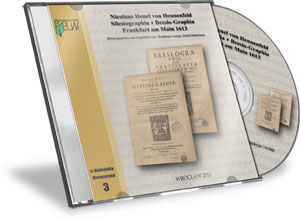Die "Silesiographia" und "Breslo-Graphia" von Nicolaus Henel von Hennenfeld
|
Author: Detlef Haberland Edition I Format of publication: DjVu |
|
Accessible in Digital Library of Wroclaw University
https://www.bibliotekacyfrowa.pl/dlibra/publication/31994
Summary
Nicolaus Henel von Hennenfeld (1582 Neustadt O/S – Breslau 1656) was the most important humanist historiographer of Silesia. After having visited Latin schools in Neustadt, Troppau and Breslau he studied for a short period of time law in Jena. But the sudden death of his father made it impossible to continue the studies. He had to leave the university at the end of 1602. Henel was appointed to the post of private tutor in the house of Nicolaus III Rehdiger, a member of one of the most famous Silesian families, which had come to fortune, reputation and influence of a manifold, successful trade. The family Rehdiger also made itself a name in the „Respublica Litteraria“. Nicolaus, together with his uncle Thomas, an outstanding humanist connoisseur and collector, who‘s collection of rare and valuable books become cornerstone of the famous City Library of Breslau, was one of the individuals, who shaped the intellectual life of Breslau for years. He was the main character in a circle of learned friends to which belonged poets and savants, whose names were well known and respected also beyond the borders of Silesia.
By this prominent contact Henel educated himself to a scholar; accompagning the two sons of Rehdiger from 1609 to 1613 through France, Italy and Austria was as well for him a first class occasion of education. When arrived in Breslau in January 1613 Henel settled as lawyer and published in the same year the Silesiographia and Breslo-Graphia which made him famous during his lifetime and until today.
1618 he became „Landschreiber“ (secretary) of the principality of Münsterberg, then its vice-chancellor. These high-ranked juridical and diplomatical activities brought him in touch with many important public figures. In 1631 Emperor Ferdinand II honoured Henel with the title of an imperial councillor.
Invited by the Silesian dukes Johann Christian and Georg Henel, took over in 1637 the position of a syndicus for at least six years, and in 1639 he accepted, in addition to this duty, the nomiation to a princely councillor. After a renewed appointment as imperial councillor, he was elevated to noble rank and in 1653 received title of imperial count palatine.
Besides his political and administrative achievements, Henel has merits in the political-cultural fields, having overseen the donation of the important book-collection of Thomas Rehdiger to the city of Breslau. Not only he has formulated the contract, but also the transaction itself was his own idea that was initially conducted by him in cooperation with the Rehdiger family.
Henel‘s works have the features of the late humanism; besides juridical and historical studies he published paraphrases of the epigrams of Catull. The book with the title Otium Wratislaviense is a collection of thematically wide-ranged essays concerning juridical, historical and philological matters. Unfortunately, his great chronicle of the principality of Münsterberg and the town of Frankenstein from the year 1630 was never published, even until today. To his oeuvre belong also numerous occasional writings celebrating the memory of friends which were witnesses of his extended erudition and his extensive biographical writings which show impressionable his great diligence, his astonishing learnedness and his vivid interest in the rich history and culture of Silesia.
With his main works, the Silesiographia and Breslo-Graphia, written hundred years after the „Descripcio tocius Silesiae“ of Bartholomäus Sthenus (1512/13), Henel made a new approach to writing on the geography, history and institutions of Silesia. He was convinced that it was necessary to formulate new learned methods of understanding profane and religious problems, as well as to develope the individuality by education. This is complex idea created in accordance to principles of the Luther’s and Melanchthon’s Reformation: the human being should be able to adapt the world as the visible sign of God‘s creation and to understand it. The studies of the Silesia region and the town of Breslau are even more than this: They are forms of the concrete profane adaption of the world within the antique tradition and in this sense a genuin humanist impetus.
Henel has created compact texts which are shaped by an easily understandable construction and by many inserted quotations of classical authors, regional sources, poems of contemporary poetae docti and important savants. These texts are at the same time both informative and diversified and have a close focus on the reader of his time. Because of this, reader did not expect a disturbing book by nowadays standards but one which enriches him intellectually by the abundance of well structured and rhetorically well formulated thougths and facts.
Within the frame of humanist efforts to create an stand alone intellectual culture on the basis of the historical tradition but also in clear distinction from the Italian humanism Henel was able to reach this aim to give an impressive example of the independent cisalpine culture, especially that of Eastern Europe. Silesia as one of its most important regions was a valuable object of his efforts.

